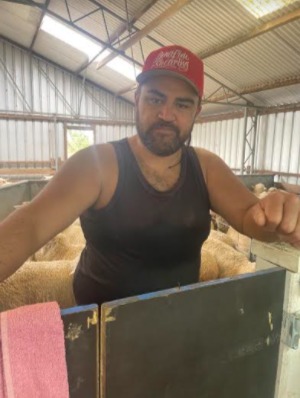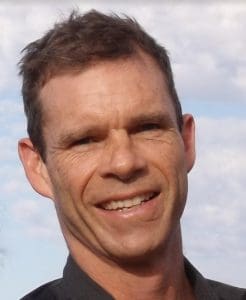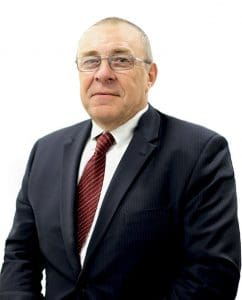
Walcha shearing contractor Tete Petuha is ready to hire Pacific island workers.
AUSTRALIA’S wool industry is readying itself to employ Pacific island and ag visa holders to alleviate the shearer shortage while recognizing the need to treat the workers fairly.
Claims this month in a Senate hearing that Pacific Island Seasonal Worker Programme visa workers were “treated like slaves” while picking fruit have highlighted the need for the wool industry to not make the same mistakes.
Recent worker visa changes will enable unskilled Pacific island workers to be employed as rouseabouts, trainee shearers and wool classers in Australia, potentially alleviating the sector’s labour shortage.
At least two Australian shearing contractors with family and cultural links to Samoa, Fiji and Tonga are ready to take on PI workers when new visa arrangements are finalised, while an experienced PI program adviser has suggested the accreditation of contractors and producers to ensure success.
Industry must be vigilant – SCAA

SCAA secretary Jason Letchford.
Shearing Contractors’ Association of Australia secretary Jason Letchford said the industry has to be vigilant to ensure that Pacific island workers are looked after.
“There are strict laws against doing the wrong thing and if we want to have people working in our industry, we need to look after them.
“And that’s where agriculture is maybe behind other industries who have placed a higher value on their employee loyalty, and that’s where we need to transition to,” he said.
“We are seeing that already in shearing where if you don’t invest in your workforce (with facilities and conditions) other than pay, you don’t have anything to sell and you might not have any workers.
“In the shearing industry, we are hiring out specialized labour and if we don’t have that, we’ve got nothing.”
Mr Letchford said shearers recently have become more selective about where they work, basing their decisions on more than just a shearing rate.
“The industry needs to mature in terms of offering better conditions and other incentives to be loyal to their employers.”
Mr Letchford said the shearing industry has seen what other industries have done with workers in the Pacific island workers programs. After hearing the recent claims of low pay rates for SWP workers in the horticulture industry, he said the wool industry had the advantage of the Pastoral Award setting minimum standards of pay.
“The minimum wage (for a shedhand) in the shearing industry is about $1200 a week, and the other benefits such as accommodation are on top of that.”
Mr Letchford said the industry is prepared to take Pacific Island and other visa workers because it has been absorbing workers from outside local areas, with contractors organising accommodation.
“We are prepared for that, it is our next stage and we are having that detailed discussion with the authorized providers to start accessing these workers in 2022.”
Mr Letchford said under the new PI and ag visa changes, unskilled overseas will be able to be employed and “upskilled” on the job in the typical stream starting as shed hands and becoming shearers.
“It is a huge opportunity for our industry to actually have some sort of tenure process where we look after the workers and they look after the employer, and upskill into shearing.”
He said only a small percentage of the shed hands coming into Australia from New Zealand had graduated into shearing.
Mr Letchford said it is still “early days” and the wool industry will be competing with other ag sectors for the overseas workers.
“So if the shearing industry thinks it can do anything but provide above minimum standards they are not going to be competitive in accessing these workers and keeping them.”
Producers and contractors must be accredited

Former AWGA director Robert Ingram
Delegate wool grower Robert Ingram said he wanted sheep producers to be vetted by an accreditation system before employing PI labour to ensure they had suitable accommodation and work facilities.
“If we are going to make it work, that’s what’s got to happen.”
Mr Ingram working extensively to extend Pacific island worker programs accessibility to the wool industry. He was the initial team leader for the Labour Mobility Assistance program — the forerunner to the Pacific Labour Facility — and also unit policy sector analyst with the PLF. The PLF supports the administration of the Pacific Australia Labour Mobility (PALM) scheme; the new integrated approach to the Seasonal Worker Programme (SWP) and the Pacific Labour Scheme (PLS).
Mr Ingram is also a former Australian Wool Growers Association director and Wool Industry Consultation Panel member. He said having a social and cultural understanding of the PI workers is critical to the success of their successful employment.
He supported the contention that the recent Senate hearing evidence was a “wake-up call” to the wool industry.
“If the industry wants to access this additional stream of labour for the industry long-term, there are some structural reforms (accommodation and facilities) at a farm level that have to take place.
“What the government does not want to see is that four shearers have been living in sub-standard accommodation on a squattocracy property 200 miles north of Wentworth on the Darling River.”
Mr Ingram said visa application changes to bring overseas workers in were only finalized late last year.
“I think to get from the position of not having the visa access until November last year and to where we are now, I think we’ve done really well.”
Pacific Island workers waiting for the call
Walcha shearing contractor Tete Petuha, said he was prepared to take on four Samoans and his brother-in-law, a Fijian shearer and contractor, is also ready to take on PI workers.
“All I’m waiting for is for them to push the button and I will have people from Samoa to go and Fiji also.
“They are waiting for the call.”
He said the changed visa arrangements represented a good opportunity for PI workers and would also benefit the industry.
“But my biggest concern is that we are going to get them here, get them trained and out in the industry and they are not going to be looked after.
“If they are not looked after, they are only going to send the message back home that this isn’t working,” he said.
“The game is hard enough without being neglected.”
Mr Petuha said the best approach would be to start the PI workers as rousabouts or shedhands and then train them as shearers, which is how he started in the industry.
“The entry level into this industry is around $1000 a week and they can’t be paid less than that.”
He supports accreditation of contractors and producers for the hiring of PI workers. Mr Petuha said he also knows of other contractors prepared to take on the PI workers.
“To have them come into the industry is only going to be a good thing.”
Frustration among contractors and the industry – Laurie

AWI chairman Jock Laurie.
Mr Petuha’s team shears the sheep of Australian Wool Innovation chairman Jock Laurie. Mr Laurie told Sheep Central that with contractors ready to mentor PI workers, they should be out here now and being trained.
“I don’t know what the hold-up is, that’s the frustrating part.
“We’ve got people who will mentor them out here in Australia, and because they are New Zealanders or Fijian they understand what’s required when people come out, and they are very happy to provide that support,” he said.
“Everything is set up ready to go, they are right to get people out here, but the avenue at this stage doesn’t appear to be opened up to the extent that that can happen.”
Mr Laurie said there is a level of frustration among contractors and within the industry “in being able to move these things at a level of pace and urgency that is required.”
He said the industry needed to know what it could do to speed the process up.
“You’ve got to say we’ve been talking about this for 12 months, how does it take that long to come to fruition?
“Especially when we have people who are ready to do it.”
Mr Laurie said integrating Pacific Island and visa workers was one of the wool harvesting priorities, which included maintaining its training programs and investigate alternative shearing methods such as platforms and robotics.
“What we need to do is to work across the board in all avenues and combinations of all those things to make this work.
“You’ve got to think outside the box.”
Mr Letchford said Spring this year might be the earliest opportunity to access new workers, given the “checks and balances” that will need to be in place. He said the sector will probably have enough local workers from May to August, but post-Winter the industry will need to be accessing additional labour.
Despite concerns the recent opening of New Zealand’s border might deplete shearer numbers from Australia, especially Western Australia, Mr Letchford welcomed any changes to ease the flow of workers across borders.
“The (shearing/shedhand) wages in eastern Australia are now so attractive for New Zealand to come across that we will be a winner (from the border opening).”
All options should be on the table – WoolProducers
WoolProducers Australia chief executive officer Jo Hall said given the sustained shortage of wool harvesting staff, as highlighted by the COVID pandemic, WoolProducers had long been saying that all options must be on the table to address this issue.
“The possibility of a potential new pool of workers from PI is very welcomed.”
She said it is essential that all workers, including new entrants to industry are treated well.
“Wool growers and contractors should be viewing treatment of staff as an investment in their individual businesses – it’s as simple as showing mutual respect between all parties.
“The industry simply will not attract or retain workers if they are not treated properly,” she said.
“This extends beyond respectful interaction between producers, contractors and staff — it also includes the provision of adequate facilities and general working conditions.”



It’s good to see you getting workers in from the islands, but first you need to get conditions up to scratch first. There are that many shearing sheds out there not up to scratch, no jugs, microwave, no fridges and no hot water. Hello, it’s 2022.
I worked in the shearing industry for 20 years in the Western Division of NSW as a cook and later as a roustabout. So I totally hear you regarding the conditions that shearers and shed staff have to endure. These include poorly equipped kitchens, some sheds having stoves and fridges that didn’t work properly, and in some cases, we got those items from home to be able to cook a meal.
There were beds and mattresses that were only fit for dogs to sleep on. Some places had gas stoves, but no gas, so again we would get gas from home.
Contractors should advise the farmers what improvements they want before they strike a blow.
Well done Robert Ingram, I know how much you have done to progress this issue. You will succeed.